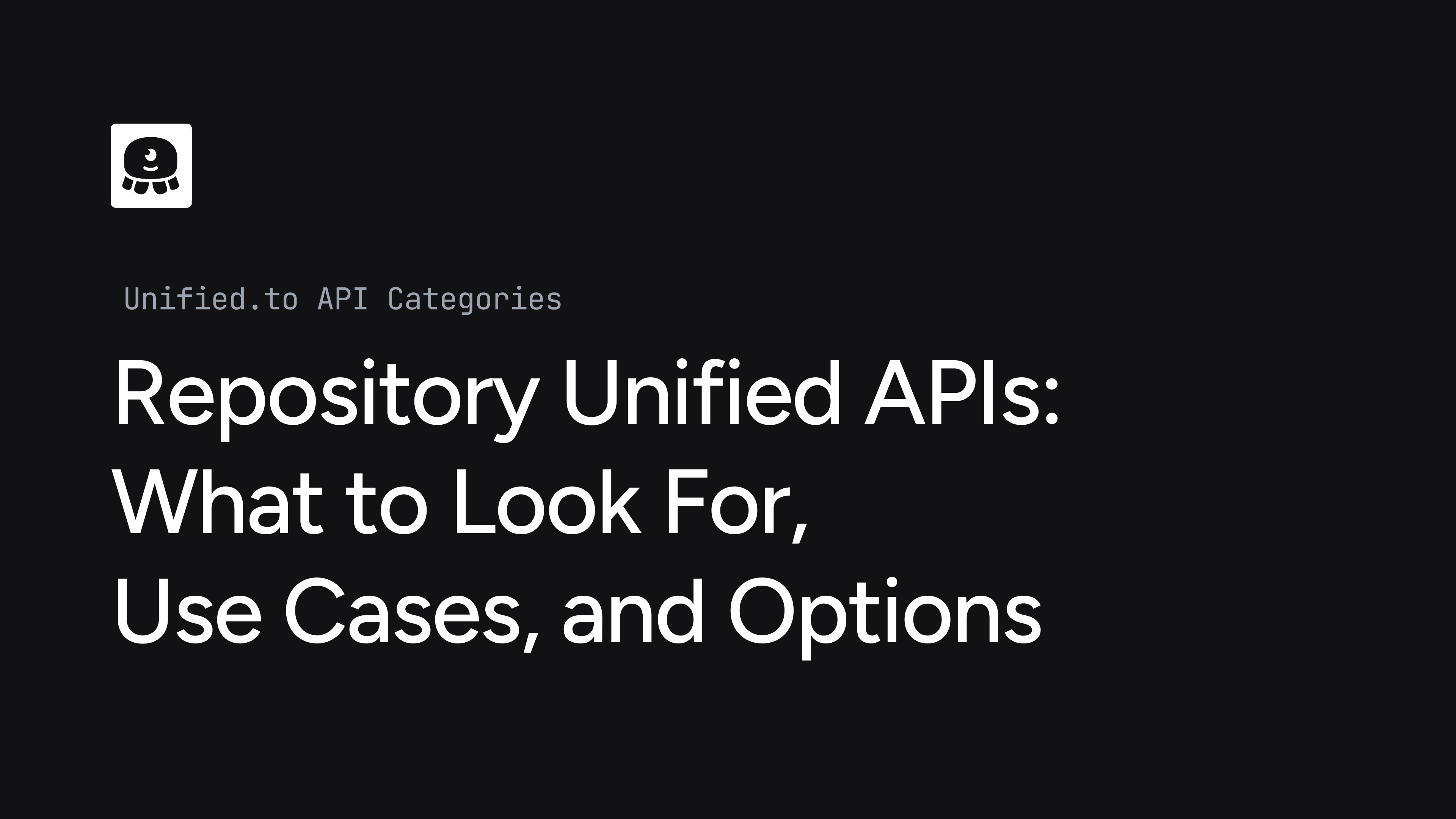Repository Unified APIs: What to Look For, Use Cases, and Options
September 24, 2025

Managing source code is central to modern software teams. But integrating directly with repositories like GitHub, GitLab, and Bitbucket comes with complexity. Every provider has unique APIs, auth flows, webhook models, and object structures.
A Repository Unified API simplifies this. Instead of building separate integrations, you connect once to a normalized API that abstracts those differences. You can fetch repositories, commits, branches, pull requests, and issues through a single integration surface.
What is a Repository Unified API?
A Repository Unified API acts as a translation layer between your app and multiple source code systems—GitHub, GitLab, Bitbucket, Azure Repos, and others.
- Direct integration: requires custom builds and maintenance per provider.
- Unified approach: normalizes objects like
Repository,Commit,Branch, andPullRequestinto a consistent schema, while still exposing raw payloads for provider-specific fields.
The result: faster launches, less integration debt, and consistent access patterns across platforms.
What to Look For in a Repository Unified API
When evaluating providers, consider both coverage and the underlying architecture:
- Supported platforms – GitHub, GitLab, Bitbucket, Azure Repos, and more.
- Normalized schemas – Consistent objects for repos, commits, branches, pull requests, and issues.
- Real-time vs. polling – Some APIs deliver live updates via webhooks; others fall back to sync jobs.
- Read/write support – Ability to create branches, issues, or pull requests, not just read.
- Security & compliance – SOC 2, GDPR, and ideally zero-storage architecture (no customer data cached).
- Developer experience – SDKs, sandbox data, webhook reliability, and error monitoring.
- Pricing model – Usage-based vs. per-connection, and whether costs scale predictably with volume.
- AI-readiness – Can data flow directly into copilots or LLM agents for contextual coding assistance
Use Cases for Repository Unified APIs
- DevOps & CI/CD tools – sync repos, branches, and commits across multiple platforms.
- Engineering analytics – standardize commit, PR, and contributor metrics across systems.
- AI copilots – retrieve repo context in real time for code assistants and LLM agents.
- Project management – link issues and commits across providers.
- Security & compliance – scan repos for secrets and vulnerabilities through one consistent interface.
Repository Unified API Options in the Market
Only a few unified API providers cover repositories directly. Here's how they compare:
| Feature | Unified.to | Truto.one | Unizo.ai |
|---|---|---|---|
| Integrations | Dedicated Repository category: GitHub, GitLab, Bitbucket | CI/CD & Version Control Unified APIs covering GitHub, GitLab, and Bitbucket | SCM Unified API: GitHub, GitLab, Bitbucket, Azure DevOps |
| Data Model & Normalization | Delivers normalized objects for repositories, commits, branches, pull requests, and issues, while allowing passthrough for raw fields | Supports custom unified models and Proxy APIs for raw payloads | Normalized schema for repositories, commits, branches, and pull requests, with flexibility to extend models using Schema Studio and to request raw provider payloads via a nativeResponse option |
| Real-Time Delivery | Every request is real-time via native and virtual webhooks | RapidBridge provides 5-minute syncs by default, with real-time supported where providers expose webhooks | Real-time webhooks and event integrations |
| Security & Compliance | SOC 2 Type II, GDPR, and CCPA compliant with zero storage of customer data | SOC 2 Type II and ISO 27001 certified and states that it does not store customer data | Zero-retention claims that customer code and findings are never stored |
| Credential Management | Supports OAuth2, API key, and token flows with optional credential storage in AWS Secrets Manager | Authentication supports OAuth2 and API keys through a pluggable UI | Authentication is handled through an API key and integration ID, rather than a universal OAuth2 flow |
| Developer Experience | Developer experience is strong, with SDKs in seven languages, a sandbox, and MCP server support for AI agents | REST-first, SDKs are not a core focus | REST-first, supported by multi-language SDKs (Node.js, Python, Go, Java) |
| Pricing Model | Transparent usage-based: e.g., $750 for 750K calls/month | Pricing starts at $499/month (Foundation) with 100 connections and 50K API calls | Tiered plans starting with Free (2k calls) and Launch (50k calls). Pricing not public |
| Ideal Use Cases | SaaS platforms embedding repo data, AI copilots, analytics, compliance | SaaS teams prioritizing CI/CD and version control coverage, especially where 5-minute sync intervals are acceptable | Enterprise pipelines and DevOps reporting, with broader SCM scope including Azure DevOps |
| Differentiators | Real-time, zero-storage, AI-ready infra. Full CRUD across repo objects | CI/CD focus and sync-based RapidBridge design, which appeals to teams prioritizing pipeline coverage with optional real-time where available | Wider SCM scope including Azure DevOps and enterprise-oriented pipelines |
Why Unified.to Leads in the Repository Category
Most unified API vendors focus on HR, CRM, or Accounting. Repository coverage is newer, and often bundled into CI/CD or SCM categories without deep normalization.
Unified.to is different. We offer a dedicated Repository category with GitHub, GitLab, and Bitbucket connectors today, with Azure Repos and additional SCM systems on the roadmap. Every request is real-time, zero-storage, and normalized into clean schemas—ideal for AI-native products and SaaS platforms that rely on code data.
What sets Unified.to apart:
- Dedicated coverage: GitHub, GitLab, Bitbucket today, with additional SCM systems on the roadmap.
- Real-time model: Native + Virtual Webhooks ensure live data every call.
- Security by design: Zero-storage architecture, SOC 2 Type II, GDPR, and CCPA compliance.
- AI-native: Repository data is available directly in the MCP server, making it executable by copilots and LLMs without glue code.
Integrating with repositories shouldn't slow your roadmap. With Unified.to, you integrate once and unlock repository coverage that's real-time, secure, and AI-ready.
If your roadmap includes DevOps, analytics, or AI copilots, start your free 30-day trial or book a demo to see how Unified.to helps you ship faster.
